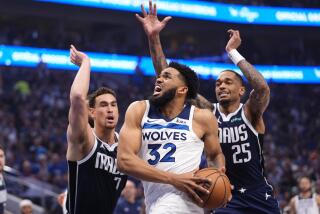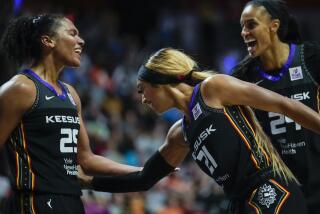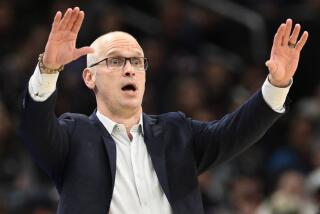The Apple Bites Back
NEW YORK — Just what he needed, another longshot.
Isiah Thomas, whose whole life has been a longshot, came to Gotham to save the day, but he has been here almost 15 months and the natives are getting restless.
Last season, when he revived the Knicks, ESPN the Magazine put him on its cover with his prize acquisition, Stephon Marbury, and the headline, “Can Steph and Isiah Save the East?”
Unfortunately for them, that was last season. This season they resumed their long march to nowhere. At last week’s trading deadline, division rival Philadelphia got Chris Webber and division rival Boston got Antoine Walker back. Weeks before, division rival New Jersey got Vince Carter.
Thomas got Malik Rose, Mo Taylor, two No. 1 picks and grief.
On the back of the New York Daily News was a full-page picture of Thomas looking wan, next to the words, “DUNCE CAP.”
On the back of the New York Post was a full-page picture of Thomas, looking agitated, with the words, “BUM DEALS.”
These days among the Knicks, struggling at 23-33, one takes one’s silver linings where, and if, one can find them. Assistant coach Brendan Suhr handed Thomas the Post page with a picture of Pope John Paul II on the front and Isiah and “BUM DEALS” on the back.
“Take that home and show your daughter,” Suhr said. “You and the pope!”
Exactly. In the world capital of the culture of celebrity, John Paul II and Isiah Thomas are the same thing: stars. It was why the city fell at Thomas’ feet when he replaced shy, retiring Scott Layden 15 months ago and began giving everyone what they craved most and hadn’t had in years ... action!
Thomas backed up the truck, unloading Coach Don Chaney, Keith Van Horn, Antonio McDyess, Howard Eisley, Charlie Ward, Clarence Weatherspoon, Michael Doleac, Shandon Anderson, Othella Harrington and Frank Williams.
The Knicks were 10-18 when Thomas arrived and 25-27 on Feb. 8, when they almost threw him the first midseason parade. Madison Square Garden President James Dolan said they could go “all the way.” After a Feb. 27 victory in Miami over the 21-29 Heat, a WFAN host crowed, “The Knicks are back! The Knicks are back!”
They didn’t even make it to .500, finishing 39-43, although that was good enough for No. 7 in the East. They lasted four games in the playoffs, all losses to the Nets.
This season, they started slowly and the new people began getting recycled too. Before Coach Lenny Wilkens “resigned,” Thomas sent his assistant, Mark Aguirre, downstairs to join Wilkens’ staff, and there was an awkward moment when Aguirre and Suhr negotiated for the last remaining chair on the front row.
Around here, they’re not particular about who’s being shipped out as long as someone is, and Thomas has done the most dangerous thing of all. He raised expectations.
By turns, Thomas is surprised (“One thing I’ve never been called, is stupid”) and resolute (“They’ve never met anyone like me”), but he understands it.
“Being a player and being a coach,” Thomas says, “everything that goes along with that and all the years I’ve had in other places, it helped to prepare you for New York. But you just can’t understand it unless you live here. I mean, you really can’t.
“And the one thing you can never do is take it personal because it’s not personal. You’re part of the entertainment show.”
It’s not a problem at all, if you can take a picture of yourself with “DUNCE CAP” next to it impersonally.
We’ll Take the Bill Now, Waiter
Thomas’ most daring move, or biggest mistake, was taking the job after the Knicks put off rebuilding as long as it was humanly, or corporately, possible.
Pat Riley left in 1995, knowing Patrick Ewing, John Starks and Charles Oakley had seen their best days. Nevertheless, they maintained the illusion they were a contender, at least, which seemed good enough in the city, clinging to its memories of the ‘90s.
In the spring of 1999, Coach Jeff Van Gundy, who had been earmarked for termination, led his eighth-seeded team to an improbable berth in the NBA Finals, where it lost in five games to San Antonio.
In 2000, the Knicks got back to the East finals but in 2001 were eliminated in the first round. Garden President Dave Checketts was fired within days. Van Gundy resigned 21 games into the next season and there went their illusions.
Dolan, the new president, was the son of the head of Cablevision, the corporate owner, and had no experience in sports. He would be on the job for three seasons before the Rangers or Knicks even made the playoffs, once deemed mandatory.
People whiled away the time saying things such as, “You can’t rebuild in New York.” In the heart of the cold, cold city, Dolan actually tried to sell the notion that they were more successful than the 1999 team with all its palace intrigue.
“What were you guys writing about that year?” he asked Knick writers in an impromptu interview in the fall of 2002 that suggested why he did so few. “This team has character and composure, a lot more composure than that team.”
“This team” missed the playoffs by five games. The empty seats became so obvious, the Knicks finally acknowledged the end of their nine-season sellout streak, which may have ended at seven or eight.
Even fans knew it was time to rebuild. Paraphrasing former Knick Micheal Ray Richardson’s famous line, “The ship be sinking,” Spike Lee told the New York Times, “The ship be sunk.”
After last season’s 10-18 start, Dolan fired Layden and went looking for someone who could provide more than harmony. Knick officials approached Magic Johnson, who was busy with his business empire but told them to consider Thomas.
The rest was magic, for a couple of months, anyway.
No One Ever Met Anyone Like Him
At 44, Thomas still has the angelic countenance of his playing days, only with more lines, but, as anyone who has ever gotten in his way could tell you, he’s no one to mess with.
By now everyone knows there’s another Isiah, who will do whatever he feels he must. Of course, if you factor in his background and discount his appearance, it would be surprising if it was any other way.
He was the poorest of the poor, the youngest of nine children of a single parent on the West Side of Chicago, without enough to eat or even heat some winters. His older brothers had been basketball players of note too, but were fast disappearing into the drug culture of the street.
Thomas told of his mother, Mary, coming to the door with a shotgun when the Vice Lords gang tried to enlist her sons. However, he corrected the record in his 2002 book, “Fundamentals.” He said his oldest brother, Lord Henry, had stolen eight ounces of heroin, which they wanted back.
Isiah was the one his family adored and placed their hopes on, getting him a scholarship at St. Joseph’s High in the suburbs. He was the one who bused hours a day and adapted so fast, he says his friends accused him of “talking white.”
He was the one who never forgot where he came from, even as he drove relentlessly to get as far away as he could.
As president of the players’ association, Thomas was the last of the superstars to run it in the tradition of Oscar Robertson, for the little guys, before the David Falk clients took it over and ran it for themselves.
Thomas was also the one who made all the enemies, and all the stuff happened to.
He was left off the 1992 Dream Team, reportedly because Michael Jordan didn’t like him. He was shunned by Detroit Piston owner Bill Davidson, who had promised to put him in charge of the franchise he had turned around, reportedly for telling the press, although insiders suspect the involvement of another Davidson favorite, Tom Wilson, the head of the business side.
Somewhere in the process of going from nowhere to the top, Thomas became known as devious, no mean feat in a subculture in which everyone schemed for every waking moment. Maybe with Thomas, it was just easier to see.
Cat-quick on the floor, he displayed a dazzling intelligence off it. He definitely thought up some new ones, like the time when he was Toronto Raptor president and he returned to Detroit on a scouting trip, in disguise.
“I go to some University of Detroit games,” Piston publicist Matt Dobek says. “I don’t even remember who the opponent was, Xavier or somebody like that. There’s like fifteen hundred people in the building, the place is empty.
“We’re behind the visiting team’s bench. I’m sitting there and a guy comes up, says excuse me, sort of a nondescript-looking guy. He sits behind us the whole game. Never says a word.
“Two, three months later, Mike O’Hara [of the Detroit News] calls me up and says, ‘Do you know who that was? Isiah Thomas!’
“I said, ‘No, it wasn’t. He would have at least said hello.’
“I’ve known Isiah for 20 years. I wrote a book with the guy!”
Thomas has a thing about information. Asked about a current college player who is generally marked down by his fellow general managers, Thomas says, “That’s what they want you to think.”
“I guess it started when I got drafted,” he says of his reputation. “You’re the turnaround guy, you go in when things are bad and you fix it.
“When I first got drafted to Detroit, that’s kind of what we did. Toronto was a startup. Indiana [which he coached for three seasons] was basically a turnaround because they had stripped the team down after they had gone to the [2000] finals. Now you’re here trying to strip it down and turn it around....
“There have been some guys that over the years have taken shots at me, but there are just as many who have been kind to me. And I’ve always looked at it as the entertainment business, which is what we’re in. Some days you wear the white hat, some days you wear the black hat.
“That comes with the territory. When I played with the Detroit Pistons, we had to wear the black hat because the Lakers and the Celtics had all the white hats.”
Thomas always has a move in mind. It’s always daring, imaginative and has a chance, however slim.
Last season, it was Rasheed Wallace, who was persona non grata in Portland and said he’d take the $5-million veterans exception to play for Thomas. It might have happened, but the price dropped so low, the Pistons acquired Wallace, won the NBA title and persuaded him to stay.
Now, insiders are watching Thomas’ warm relationship with LeBron James’ agent, Aaron Williams, just in case James wants to leave Cleveland in 2008.
Thomas has a coach to hire this summer. The top candidates are Phil Jackson and Larry Brown, who are also on the Lakers’ list, so imagine the possibilities.
They want action? No matter how this turns out, Thomas will show them action.
“Don’t worry about Isiah,” said his old coach, Chuck Daly. “You could drop him out of an airplane at 10,000 feet and he’d land on his feet.”
Fortunately or not for Thomas, he landed here this time. Now it’s Isiah and Gotham, take your pick.
*
(BEGIN TEXT OF INFOBOX)
Keeping busy
Trades for forwards Mo Taylor and Malik Rose just before the NBA trading deadline Thursday were the latest deals Isiah Thomas brokered since taking over as New York Knick president of basketball operations in 2003. A look at Thomas’ major moves:
* Dec. 30, 2003: Shipped forward Clarence Weatherspoon to the Houston Rockets for guard Moochie Norris and center John Amaechi.
* Jan. 5, 2004: Acquired guard Stephon Marbury, swingman Penny Hardaway and center Cezary Trybanski from the Phoenix Suns for forward Antonio McDyess, guard Howard Eisley, guard Charlie Ward, forward Maciej Lampe and the rights to guard Milos Vujanic. The Knicks also gave Phoenix their first-round pick in the 2004 draft as well as a future conditional first-round pick.
* Jan. 14, 2004: Fired Coach Don Chaney and his top two assistants Brendan Malone and Lon Kruger. In the news conference, Thomas announced that Brooklyn native and Hall of Famer Lenny Wilkens would replace Chaney, who left with a 72-112 record since taking over for Jeff Van Gundy in 2001.
* Feb. 15, 2004: Acquired forward Tim Thomas and center Nazr Mohammed in a three-way trade involving the Atlanta Hawks and Milwaukee Bucks. In return for Thomas and Mohammed, the Knicks sent forward Keith Van Horn to the Bucks and center Michael Doleac and a conditional 2005 second-round draft pick to the Hawks.
* March 12, 2004: Signed forward Vin Baker, who was released by the Boston Celtics in February.
* Aug. 5, 2004: Acquired guard Jamal Crawford and forward Jerome Williams from the Chicago Bulls for guard Frank Williams, forward Othella Harrington, Trybanski and center Dikembe Mutombo.
* Jan. 22, 2005: Hired assistant coach and former Knick player Herb Williams as head coach after Wilkens resigned.
* Feb. 24, 2005: Acquired forwards Mo Taylor (from Houston) and Malik Rose (from the San Antonio Spurs). The Knicks got Taylor for Baker, Norris and a 2006 second-round pick. They acquired Rose and 2005 and 2006 first-round picks from the Spurs for Mohammed and guard Jamison Brewer.
More to Read
Go beyond the scoreboard
Get the latest on L.A.'s teams in the daily Sports Report newsletter.
You may occasionally receive promotional content from the Los Angeles Times.










